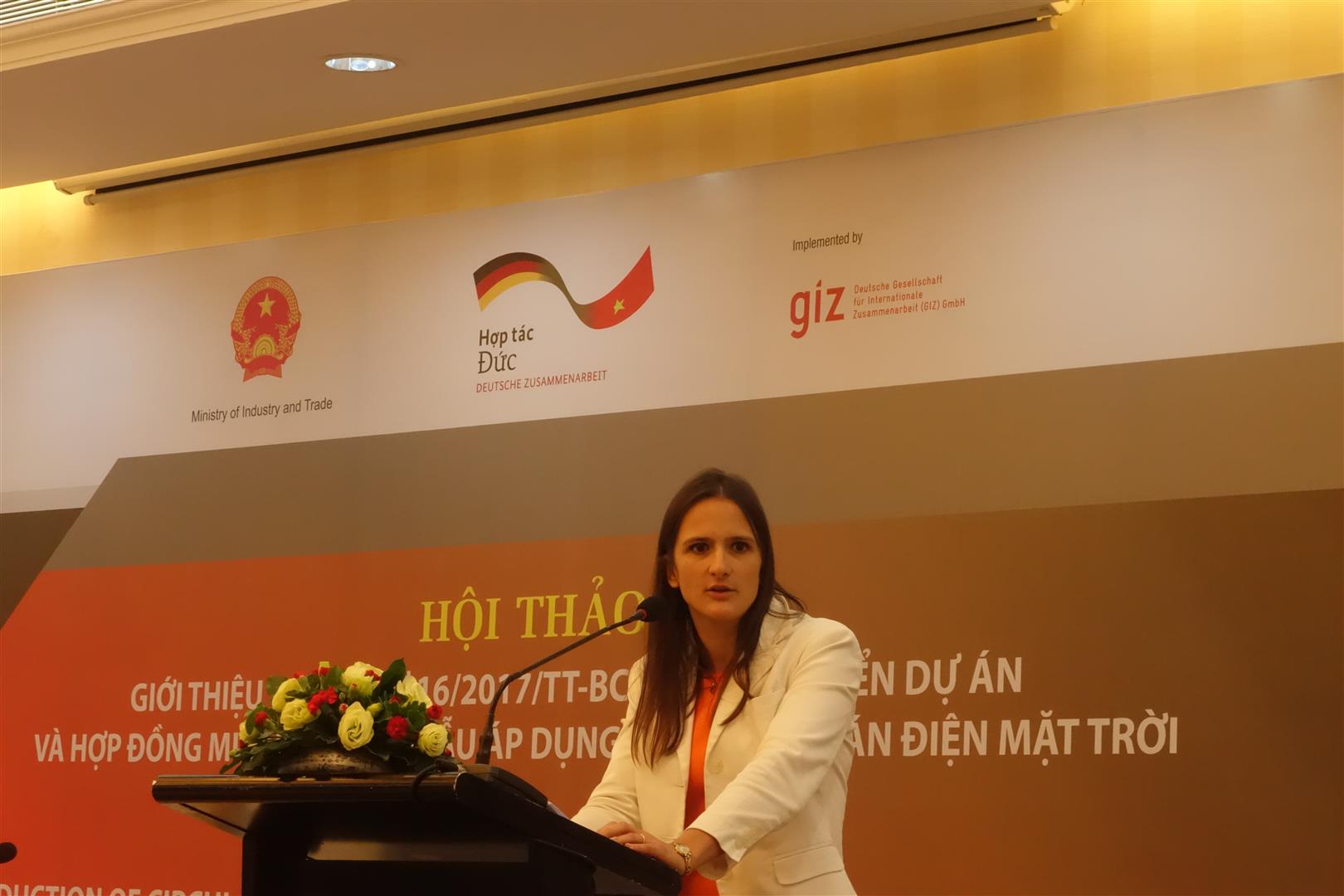Solar market embraces local-international partnerships
 |
| Sonia Lioret, head of GIZ’s 4E project addressing participants at the workshop |
This insight was shared today with more than 100 representatives from provincial authorities, investors, and other stakeholders at the workshop entitled “Introduction of Circular No.16/2017/TT-BCT on Solar Power Project Development and Standardised Power Purchase Agreement for Solar Power Projects.”
Solar power is high on the agenda in Vietnam since the publication of the prime minister’s Decision No.11/2017/QD-TTg in April, which sets the feed-in-tariff at 9.35 US cents/kWh. However, the decision also sets June 2019 as the deadline for the solar power plants to be built and connected to the grid in order to receive this feed-in tariff (FIT).
”In this context, the workshop is a very important initiative as it provides guidance to investors, local governments and financial institutions. It is also an opportunity for local governments to better understand the circular and gain insight into the latest solar developments, which will be helpful to better assess and approve solar power plants at provincial levels,” said Sonia Lioret, head of GIZ’s 4E project at the workshop.
As part of the workshop, representatives from the Electricity and Renewable Energy Agency explained the content of Circular 16 and answered questions from participants.
Consultants from GIZ shared international observations on solar power development in Vietnam, together with a presentation about international and regional experiences regarding the technical and financial assessment of solar power projects.
Solar projects require high upfront investment. In some provinces land availability or grid capacity limit the number of projects that can be approved by local and central authorities. It is therefore important to carefully assess the general viability of these new solar projects.
This includes the choice of the site, the experience of all parties and contract partners involved in the project, as well as the quality of the equipment and the installation process in order to avoid project failures or economic underperformance.
"As solar power is still quite new in Vietnam, bearing in mind that all projects have to be built and connected by June 2019, we believe that the combination of local knowledge and international experience will be a great recipe for successful projects,” said Rainer Brohm, a German solar energy expert who held a presentation at the workshop.
What the stars mean:
★ Poor ★ ★ Promising ★★★ Good ★★★★ Very good ★★★★★ Exceptional
Latest News
More News
- KKR and Singtel step up data centre investment in Southeast Asia (February 06, 2026 | 13:09)
- MAE names big 10 policy wins in 2025 (February 06, 2026 | 08:00)
- US firms deepen energy engagement with Vietnam (February 05, 2026 | 17:23)
- Vietnam records solid FDI performance in January (February 05, 2026 | 17:11)
- Site clearance work launched for Dung Quat refinery upgrade (February 04, 2026 | 18:06)
- Masan High-Tech Materials reports profit: a view from Nui Phao mine (February 04, 2026 | 16:13)
- Hermes joins Long Thanh cargo terminal development (February 04, 2026 | 15:59)
- SCG enhances production and distribution in Vietnam (February 04, 2026 | 08:00)
- UNIVACCO strengthens Asia expansion with Vietnam facility (February 03, 2026 | 08:00)
- Cai Mep Ha Port project wins approval with $1.95bn investment (February 02, 2026 | 16:17)















 Mobile Version
Mobile Version